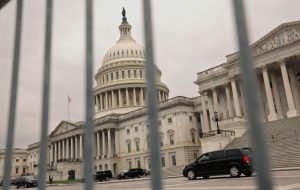Kamala Harris as Joe Biden ’s replacement for the Democratic presidential nomination feels reminiscent of her ascent to the U.S. Senate. Days after Sen. Barbara Boxer announced she wouldn’t seek re-election in 2016, Ms. Harris, then California’s attorney general, jumped into the ring.
Senators including Elizabeth Warren (D., Mass.) and Cory Booker (D., N.J.) urged their donors to support her. California’s Democratic kingpin Willie Brown , Ms. Harris’s former beau and mentor, made clear that other party aspirants should yield. After former Los Angeles Mayor Antonio Villaraigosa revealed that he was considering a bid, Mr. Brown snapped: “His loyalty and his relationship with her should be so valuable, and he should, in my opinion, see it as an opportunity to demonstrate that.” “I am hopeful,” Mr. Brown added, that he “will be rewarded with a statewide office—at some point.”
Mr. Villaraigosa genuflected, as did other ambitious Democrats, but his deference wasn’t rewarded. Rep. Loretta Sanchez of Orange County was the only noteworthy candidate audacious enough to challenge the heiress apparent. She couldn’t raise enough money to run a serious statewide campaign, while Ms. Harris racked up big-name endorsements, including from Ms. Boxer, Sen. Dianne Feinstein , Gov. Jerry Brown and Barack Obama .
Despite these advantages, her Senate campaign was beset by high staff turnover and an abrasive management style. Former aides also kvetched to the press about her lavish spending on upscale hotels and first-class flights.
Her coronation nevertheless proceeded as planned: Ms. Harris cruised through California’s jungle primary and defeated Ms. Sanchez in November, 62% to 38%. Even before she took the oath of office, the press mooted her as a potential candidate for the White House in 2020.
Ms. Harris said on Sunday that she intends to “earn” her party’s nomination. That would be a change for a politician who’s floated to the top in a one-party Democratic state with powerful patrons boosting her. The upshot has been that she has neither the substantive record nor the skills that other candidates might.
Ms. Harris grew up relatively privileged in the San Francisco Bay Area. Her Indian-born mother was a breast-cancer researcher at the University of California, Berkeley and her Jamaican father a Stanford economist.
In her 2019 memoir, “The Truths We Hold,” she recounts being offered a position as a deputy district attorney in Alameda County once she finished law school at UC San Francisco and passed the bar. She failed the exam on her first try but was hired anyway: “I wondered if people thought I was a fraud.”
During the mid 1990s, she dated Mr. Brown, then speaker of the California Assembly. He appointed her to two state panels—the Unemployment Insurance Appeals Board and the California Medical Assistance Commission—that together reportedly made her more than $400,000 over five years . But his most valuable favor was to connect her to party grandees and donors.
After they broke up, she tapped this donor network to run for San Francisco district attorney in 2003 on a platform of restoring competence to the office. She won, but violent crime more or less stayed the same during her seven years in office while sharply declining in the rest of the state.
In 2010 she dismissed some 1,000 drug cases, including many convictions, after a state judge rapped her for failing to disclose potentially exculpatory information to defendants, including potentially tainted evidence. When Ms. Harris ran for state attorney general that year, her Republican opponent, Los Angeles District Attorney Steve Cooley , slammed her as soft on crime.
She won by some 75,000 votes—Gavin Newsom won the lieutenant governor’s race by 1.1 million—after a big assist from Mr. Obama, who held a rally with her that October in Los Angeles. As attorney general, she targeted liberal bogeymen including Wall Street banks, for-profit colleges and energy companies, drawing on the Obama administration for support.
Her clumsy, politically motivated attacks often created victims. After she helped drive Corinthian Colleges out of business, thousands of students were stranded without degrees. Her blocking an acquisition of an insolvent hospital network at the Service Employees International Union’s urging resulted in its bankruptcy.
As president, she would have more power to destroy businesses and livelihoods—and target political opponents. In 2019, she vowed to prosecute Donald Trump if elected. She couldn’t prosecute the case for her candidacy, ran a disorganized campaign plagued by infighting, and dropped out before the first ballot was cast.
Perhaps she will do better as her party’s nominee, but her 3½ years as vice president haven’t inspired confidence. The problem with coronations is that they elevate untested leaders who may never be up for the job.


